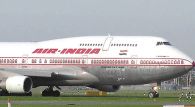 | « Back to article | Print this article |
 The months of April and May are favourable for airlines, a good time to recover their losses.
The months of April and May are favourable for airlines, a good time to recover their losses. Clearly something went wrong? Why could the airline not resolve integration issues arising out of merger (even now Air India and and Indian Airlines staff have separate salary scales and service conditions). The reason is that various internal committees squabbled for four years and yielded no result.
After the merger in August 2007, the airline set up committees to look into HR-related issues in various departments. Integration issues related to cabin crew and engineers were left largely untouched. These committees had executives from both the airlines and representatives from HR department. A post of executive director (integration) too was created.
But problems surfaced as Air India (AI) and Indian Airlines (IC) officials did not see eye to eye on integration issues.
"The initial meetings of these committees were acrimonious as members bickered about the others' functioning and procedures. Gradually the tensions decreased but the committees could not complete their tasks," said a senior AI executive.
"The difference lay in how the two airlines were managed. In a public sector undertaking, seniority is of paramount importance. However, career progression policies in AI and IC were different. Two persons with same level of qualification and experience enjoyed different grades at the time of merger," said an airline source.
While drawing up a common salary structure, it was suggested that the principle of "higher of the two" would apply. This meant that if salary scales of AI employees in one category were higher, the same would be applicable to employees of IC and vice-versa.
In reality though, the debt-ridden carrier could ill-afford increasing salaries across board.
"It was just an empty promise. The government too would not have sanctioned such a pay formula. There were other tricky issues as whether employees would agree to a pay cut (when new salaries scales are drawn)," said the executive.
"No one (from AI and IC) wanted to give up an inch. The livelihood of the employees of their department was at stake. But it is not fair to blame the committees alone. Why is no one criticising Accenture ( the consultant which prepared merger blueprint)," he added.
"In the last four years, integration has happened only at the top. There are common executive directors and common GMs in the airline. The integration process is flawed. You can't construct a house by building the roof first," said an AI employee.
Last year, the airline management again began a level-mapping exercise to fix seniority and grades of its employees but nothing has happened on it.
Finally, in March the airline appointed the independent committee headed by Justice D N Dharmadhikari to examine salary and service condition-related issues after all its internal efforts failed.
The ongoing pilots' strike is a consequence of unresolved issues and the expose the fault lines that run deep in the airline. An AI spokesperson was not available for comment.